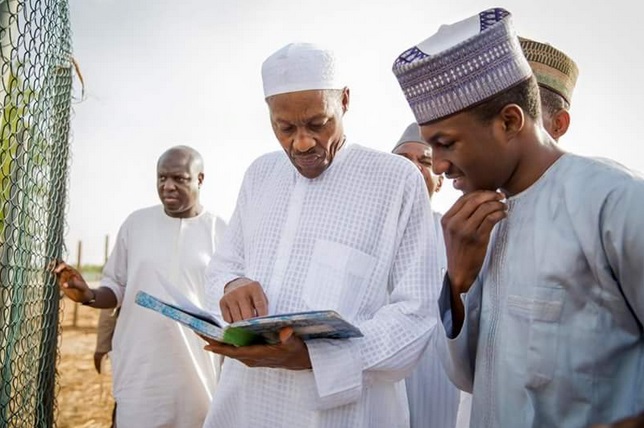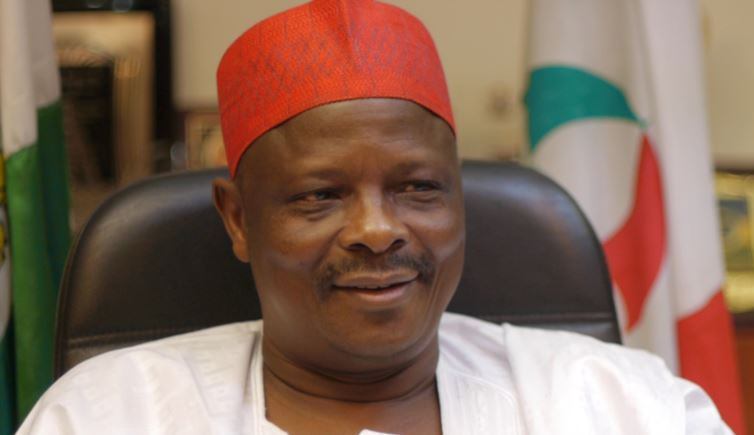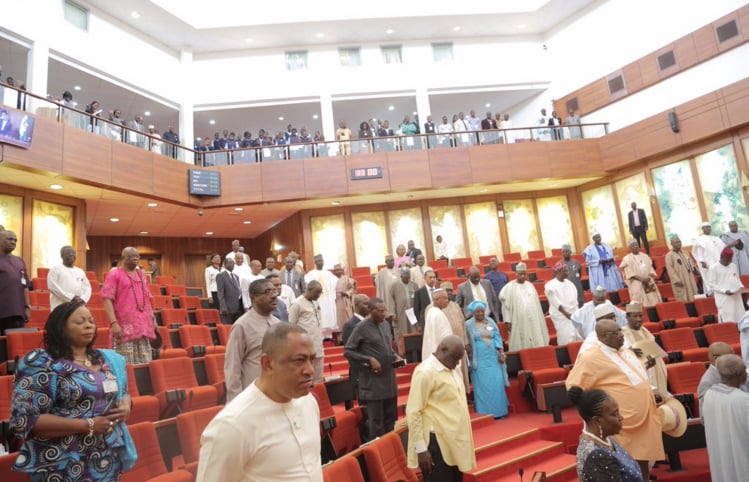President Buhari and his son, Yusuf, at his farm in Daura. Katsina
Almost everyone agrees that the problems in Nigeria or failure to address problems is a consequence of the country’s failing institutions. Others argue that there are no institutions at all; if there are, they do not just function. The current band of lawmakers responsible for enacting laws cannot do away with ambiguities to strengthen institutions; if they do, many of them will have no role in government, going by their antecedents.
Nigeria needs to stop being foolhardy and admit its foundation is faulty, the country cannot develop or become self-reliant on a patronage system of government where successive leaders only come with a different style, without addressing the fundamental flaws that have strangled institutions from functioning over the years. On the face of it, weak institutions, to Nigeria’s political elites, mean past and present leaders are not held to account hence, the kind of recycling we see.
It is notable that nowhere in the world does a patronage economy compete globally, not even regionally. So, why is Nigeria bent on keeping faith with patronage systems? For avoidance of doubt, a patronage economy is the foundation of corruption. Segments of this nation have been suffocated and suffering under this unconscionable, faulty national foundation. The regions are in pains, in agony. The economy is currently drowning, our unity threatened and fragmented. We have environmental degradation in the South South and South East and famine in the North East, where life is short and brutish. The North Central is battling with a silent emergency by itself, without the government taking a lead role.
As Thomas Hobbes, one of the greatest 17th-century English philosophers said, without a state one would have in society a “war of all against all”, hence the only solution was to create an institution for which Hobbes used the metaphor of a “Leviathan”. Without a Leviathan in control, society would be in trouble and for a functioning society, it was necessary for everyone “to submit their Wills, every one to his Will, and their Judgements, to his Judgement.” Without this there would be no knowledge of the face of the earth; no account of time; no arts; no letters; no society; and which is worst of all, continual fear, and danger of violent death; and the life of man, solitary, poor, nasty, brutish, and short.
Advertisement
Considerably in Nigeria there is a state that has saved the country from ‘war of all against all’, but the country’s weak institutions have created palpable fear and hopelessness amongst its divided citizens, cases of inequalities and impunity are on the rise. As Daron Acemoglu and James Robinson, two famous scholars argued in ‘Why Nations Fail’, the reason nations fail or succeed is not economic policies, geography, culture, or value systems, but rather political institutions. There are two types of political institutions: “extractive” institutions in which a “small” group of individuals does their best to exploit the rest of the population, and “inclusive” institutions in which “many” people are included in the process of governance, Acemoglu and Robinson argue.
Still, the questions well-meaning Nigerians are struggling with today are as follows: are leaders accountable to the majority of the citizens, do leaders take responsibility for the actions of government under their watch, do we have laws that sieves-out injustices and offer timely justice based on merits to all citizens? Many will contend that the above questions are all in the negatives in Nigeria, which means the status quo is an “extractive” one, where citizens take a back seat and a few political elites determines how society is governed.
Merely, the All Progressive Congress maintains that Nigeria’s new leader, Muhammadu Buhari, is on the path of establishing “inclusive institution,” where citizens have more say in governance, away from what we have in the past. Still, critics argue that as at date only a small group of individuals in Aso Rock runs the show. In between these two arguments, what is frightening is Nigeria is ‘building’ institutions around a personality cult rather than around structural reforms. For example, President Buhari is criticized for often expressing personalized views on matters of State. Many argue that what the law says, rather than what the president thinks, should guide a leader in any democracy. Many also argue that what will it take the Buhari government that came on a popular mandate to strengthen the country’s legal institutions rather than drive the popular anti-corruption campaign on the platform of the Buhari persona?
Advertisement
Apparently, the president came into government with a preconception that everyone else, other than himself or his close associates, does not fit into the frame of his revolutionary change agenda. That alone thwarted the very concept of strengthening institutions of government. The President seems to have ‘trust’ issues and people like that tend to confide in a few people around him; then, he drops his defences and often becomes vulnerable to their subjective interpretations in dealing with national issues. This has been my personal experience with Buhari’s government.
In a country that is widely considered to be corrupt, manipulative people are never in short supply and where you are likely to have manipulative people around leadership, there will be unnecessary pain and suffering to the lives of well-meaning citizens trying to contribute or lead a decent lives. Nepotism is also at the peak of such governments, leading to low productivity, pettiness and unhealthy rivalry that is prevalent in government today.
Though the problem with leadership in Nigeria is not peculiar to the federal level, it is even worse at the local and state government levels, where large patronage systems exists. There, family, allies and kin groups that contributed funds heavily to campaigns, constitute a nuisance, not to mention the culture of ‘godfatherism’ that secure juicy positions and contracts to recoup their investments at the detriment of public good.
Another worrying trend of patronage system in Nigeria is “security votes”. Many politicians make use of large sums of money made available from a percentage from their statutory allocation at all levels of government, monies that nobody has to account for, for the purpose of security. But in reality, many politicians use these contingency or discretional funds called security votes for patronage or in simple terms, to develop their personal estates.
Advertisement
Evidently, Nigeria cannot survive under such systems. If we continue to live as we have managed, so far, the country will not make meaningful progress. No nation can sustain an anti-corruption fight with political patronage, and no economy prospers under such systems. Patronage is antithetical to innovation, to merit and productivity, attributes necessary for development. Nigeria must learn to work with its best and not only with the privilege few that have access to power.
No one is questioning the right of the APC after winning elections to initiate the wholesale turnover in the public offices in favour of the party with the kind of mess the previous government made. There are times when patronage is necessary to put people in government who agree with your political agenda because loyalty and faith flow from such systems, but in Nigeria patronage system has not only stalled development and encouraged corruption, it has widened inequalities. It divides the country by the day.
Salkida is a freelance journalist and a conflict analyst.
Advertisement
Views expressed by contributors are strictly personal and not of TheCable.







